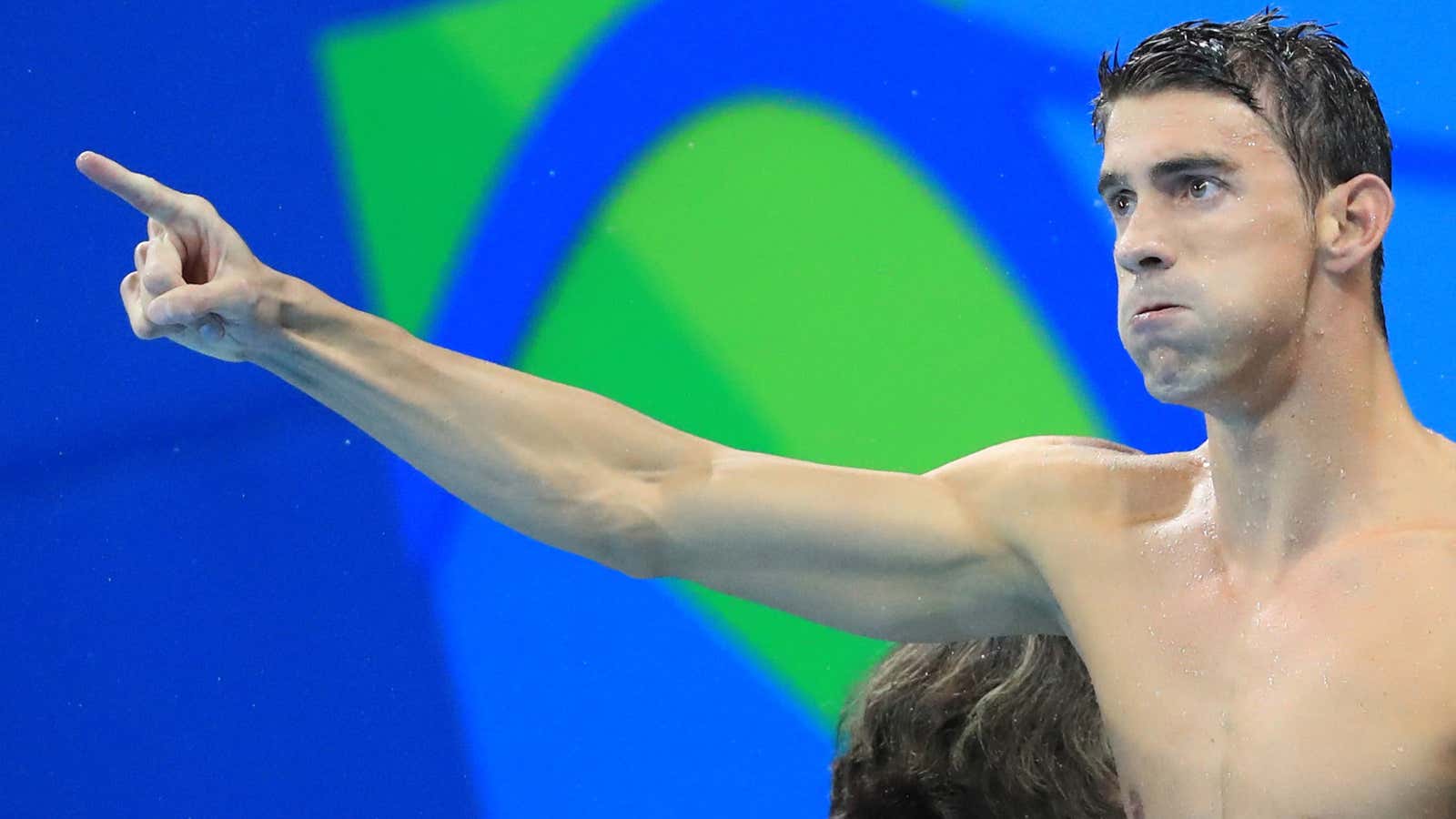An athlete may stand alone on the podium to collect an Olympic medal, but it takes a team to get there. There are coaches, doctors, family, friends, and many more who help along the way. More recently, one of the most critical additions to an athlete’s support staff is a sports psychologist.
There is an intense mental toll of reaching—and remaining—at the pinnacle of a sport. “The top six inches of the body matter just as much the rest,” says Matthew Cunliffe, a sports psychologist, who spoke with Quartz about what goes through the minds of elite athletes and how psychologists can help them win. The conversation has been edited and condensed for clarity.
When Olympic athletes try to make a comeback—some from injury, others from a break—how do sports psychologists help them?
There are two types of sports psychology. One that deals with mental-skills training. It’s teaching athletes to use psychological skills to, say, control anxiety. The other deals with psychological therapy. It uses some of the mainstream talking therapies and applies them to sports performance to deal with the underlying issues that affect an athlete.
I use cognitive behavioral therapy, for example. I look at the interaction between the athlete, the situation they are in, their physiological state, their feelings, and their behavior.
Isn’t this what coaches already do?
Yes, coaches get a flavor of psychological skills training through their education and experience. Some of the better coaches build it in their training. But what they can’t do is get to the underlying core beliefs that the athletes have about themselves and about the world. That’s where a sports psychologist really helps.
There’s also the hope that a sports psychologist uses these skills not just with athletes but also with coaches. Some times you get psychologists who work through the coach, by training them to use some of the techniques. The coach, after all, has a lot more contact with the athlete.
Why has it only recently become a trend to employ sports psychologists?
Psychology is gaining a lot more popularity. Athletes, coaches, and team directors are starting to realize that the top six inches of the body matter just as much the rest. And they need the mind to work as optimally as the the body for top performance.
There are challenges. A lot of the people doing this are unaccredited. They are not as well trained as sports psychologists for doing the kind of work needed. It does not mean they can’t do good work, but it’s that they are not regulated in how they conduct their practice.
But, overall, this is a positive shift.
What are the things that go through an athlete’s mind when they are trying to make a comeback?
There are two types of comebacks. There’s the return from injury or other life event, such as for Michael Phelps coming back from retirement or Jessica Ennis-Hill coming back from an unplanned pregnancy. Then there’s simply the return to sport in an Olympics cycle, such as in the case of Gabby Douglas.

For Ennis-Hill, she’ll have considerations about what’s in her child’s best interests. She took three months away from the sport to give birth, and then she had to decide whether she could commit to go for another gold medal. Her coach was confident that she could, but it was her decision and it was important that she made it.
In case of injuries, athletes go through a constant cycle of something called “cognitive appraisals.” The athlete is trying to make sense of their situation at every stage of the injury.
Physical factors: what type is it? have you suffered something like it before? what’s the cause? Mental factors: what’s your personality? what’s your best coping mechanism? how do you think about yourself? Situational factors: what kind of sport you are in? what level of competition you are at? Social factors: the influence of coach, family, friends, team-mates.
As the athlete goes through the rehabilitation, this cognitive appraisal will determine whether they will eventually be able to make a comeback.
So it’s a constant thing they are dealing with?
Absolutely. After the injury, there’s shock and then grief. How they deal with it will determine whether they will comeback strong.
How would you work with Michael Phelps?
I would do a needs analysis. That would help me understand what’s going on with him. What he can and can’t do. What he thinks his strengths and weaknesses are. Whether there are any areas where he needs development. Next I would talk to him to create a problem list. Then I can work with him to solve them.
How do you get athletes to open up to you?
For any psychologist, it’s about building a relationship with the athlete. If the athlete likes me and gets on with me, they will be more likely to open to me. This can take time. It won’t happen in one or two hours.
What if they don’t perform as well as they hoped?
It’s a really tough time for athletes. They would go through a period where they are questioning themselves, their work, and their skills. As a psychologist, I’d like to give them time to digest what’s happened, especially at the Olympic games for which they’ve been training for four or eight years. Then they can come to me and reflect on what’s happened. I’d like to be a mirror so that they can talk and open up. To be a sounding board for the athlete, and to start rebuilding if they are ready to do so.
Most of the time these athletes are resilient. They know that things won’t always go their way.
They know that they will have worked to control everything that they can and not worry about things they can’t control. What they can control is their body, training, mental approach, kit, equipment, etc. What they can’t control is the weather, environment, situation, referee, etc.
So we try to make athletes understand that there is a process to their sport, and that it is more important early on to get the process right than to worry about the result. Then, as the athletes get better and reach higher levels of competition, we put as much importance on the process as on the result. The hope is that the emphasis on the process will buffer the athlete from a bad loss. As long as they know that they performed to their best, they are more accepting of the result.
To win at the Olympics, everything has to go right–the body, the mind, and a bit of luck. How do you help athletes cope with the stress and anxiety that builds up before a high-stakes competition?
We simulate the pressure. So, for instance, we will make them physically and psychologically tired through a tough training session and then we get them to compete. We even get people to cheer or boo. This kind of simulation helps us push their boundaries.
We also use pre-performance routines or rituals. Michael Phelps, for instance, always has his music on. He blocks everybody out. In the end, it’s about hours and hours of practice—both physical and mental.
